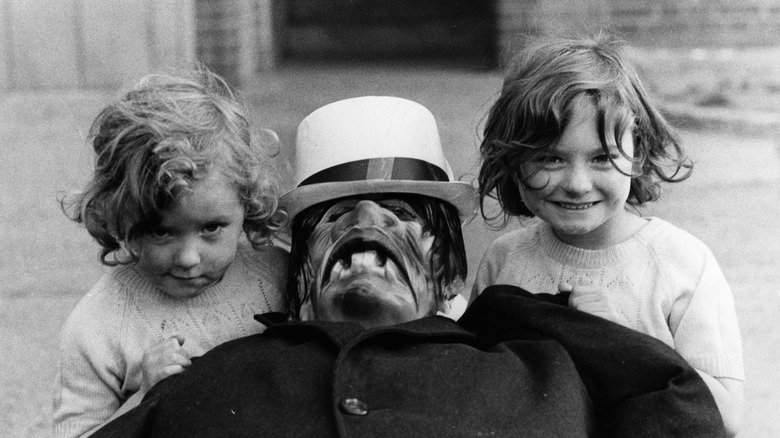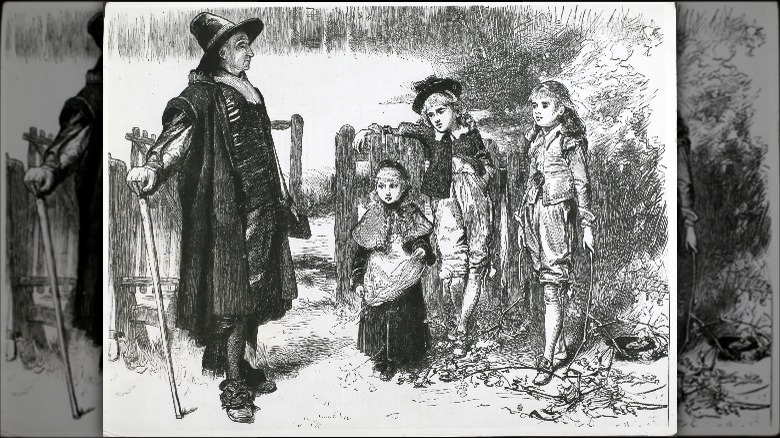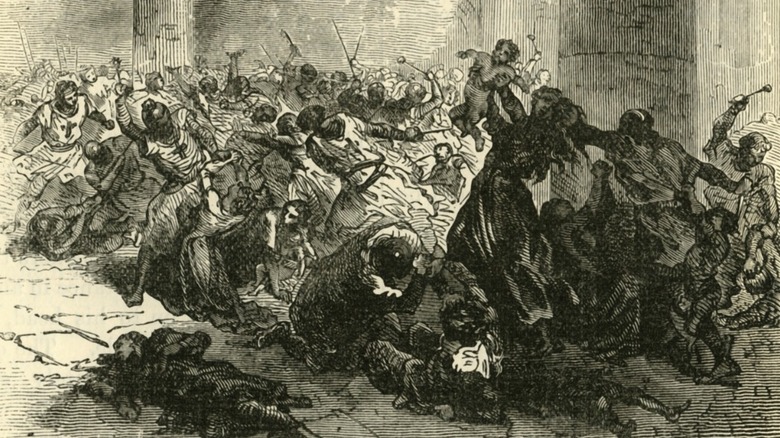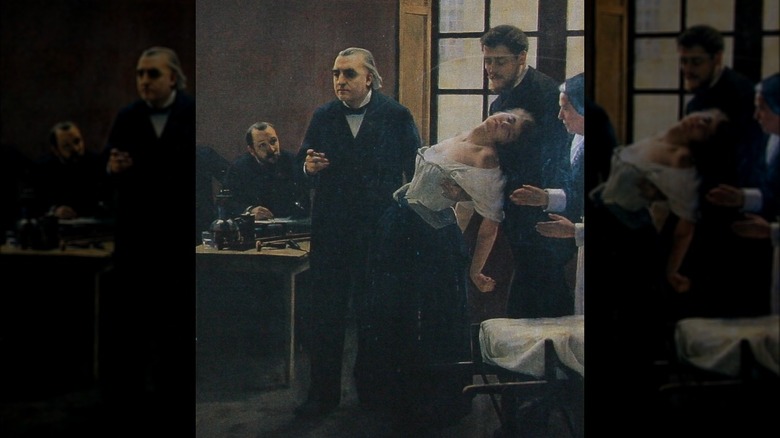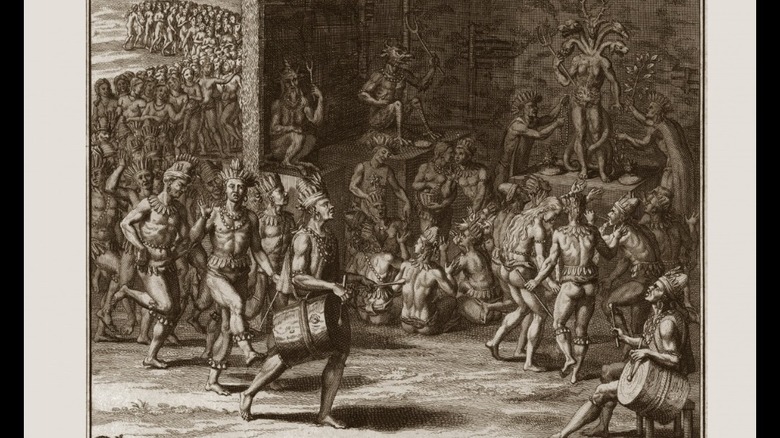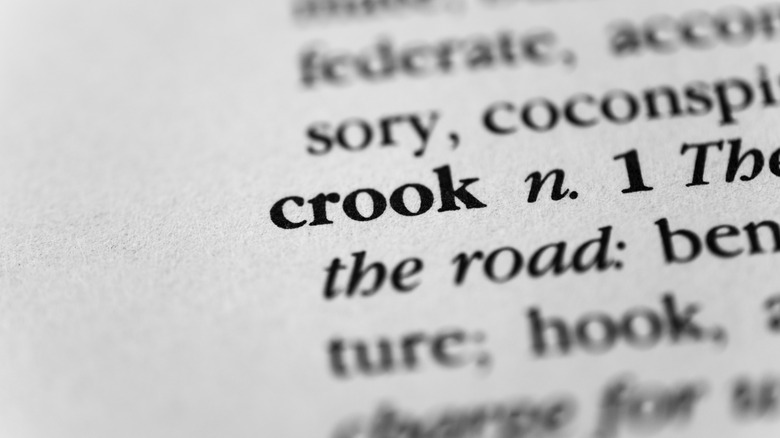Common Words And Phrases That Were Once Insults
According to Dictionary.com, there are many words, such as "broad," "fat," and "dumb" that although perfectly innocuous 70 years ago, are now considered insulting in most contexts. Naturally, this is expected. If there is one thing that is always changing, it is language. Words change their pronunciations, meaning, and connotations regularly, sometimes within a span of just a few years. So it should not be surprising that just as common words can become offensive, offensive words can shed their insulting meanings to become neutral descriptive words in colloquial and formal usage alike.
English is replete with words and phrases that were originally offensive, yet are commonplace today. In fact, you probably use many of them daily (or at least regularly) without thinking twice about it. Because of their histories, there have been renewed discussions over the appropriateness of some of these words, but for now, it seems that most of these are too ingrained to be going anywhere. Without further ado, here are some insulting English words and phrases that have evolved to be neutral – or even compliments.
Guy
Under Queen Elizabeth I and King James I, England became a Protestant country as Catholicism was banned and everyone was forced to conform to the Anglican Church. But some Catholics resisted, and in the process, gave the world a new word.
Per History, in 1605, a group of Catholics disgruntled with Protestant rule decided to blow up King James in what became known as "the Gunpowder Plot." Unfortunately, one of the plotters, Guy Fawkes, was found prowling in a Parliament basement that just happened to be full of barrels of gunpowder. The plotters were sentenced to be hanged, drawn, and quartered, but Fawkes died before the second and third parts of the sentence could be carried out. (They still did it, just for appearance's sake.)
Every November 5th – Guy Fawkes Day - the British burn guys on the street. You read that correctly. This was the initial use of the word "guy," which referred to Guy Fawkes effigies (e.g. above). Because of the association with this man, considered a traitor to his king, the Smithsonian Museum notes that it soon came to refer to people who were poorly dressed, shabby, or low class – just like Guy Fawkes. As you can tell, it was very much a pejorative. But sometimes in the mid-19th century, per the Online Etymological Dictionary, it began to refer to any man, regardless of class, becoming the neutral term it is today.
Roman Catholic
This one might surprise people. Members of this church refer to themselves with this name, in the Anglophone world, but interestingly, they are the only ones (at least among Western Europeans) to refer to themselves as such. This is because the term was originally a Protestant slur.
According to Catholic Answers, the term "Roman Catholic" was the culmination of a set of insults that Anglicans used to refer to their enemies in Rome. The forerunners of "Roman Catholic" are insults such as "Romist," "popist," and "popery." "Roman Catholic" appeared around 1600 to distinguish between Anglicans and Catholics. Anglicans, as Christ Church Anglican notes, sometimes refer to themselves as "Catholic," only considering themselves "Protestant" in a very narrow way, as opposed to Puritans and Separatists who sought a complete break with everything Catholic. So in the Renaissance, the Anglican Church saw itself as carrying on within the One True Church (the Catholic/Universal Church) – just not under the pope. Thus, the Catholics in Rome, who followed the pope, were a different sort of Catholic, perhaps not quite as authentic as those in England.
As CatholicLink notes, the term today is no longer an insult, having become the preferred demonym among Catholics in the English-speaking world that belong to the Latin Rite. However, Roman Catholics are only one branch of Catholicism — albeit the biggest, since there are 23 other Catholic Churches within the Catholic Church.
Puritan
The term Puritan can be used two ways today. Capitalized, per Merriam-Webster, it refers to a member of the Church of England that opposed all vestiges of Catholicism in the church. Lowercase, it is a slur often directed at women that adhere to a strict moral code, especially with regards to sexual matters, or are perceived as such. But the capitalized form, which today is a neutral historical term, was once a biting insult.
According to the Washington State University, the term Puritan was a taunt that mainline members of the Anglican Church used to refer to people that rejected holdover customs from Catholicism. In their quest to "purify" the Anglican Church, the Puritans, according to The Nation, came to be mocked as such "not because [they] are purer than other men ... but because [they] think [them]selves to be purer." It clearly hurt, as Puritans called it a "Soul-killing Nick-Name."
The term's use as an insult is highlighted in the Maryland Toleration Act, which was passed in 1649 to calm tensions between Maryland's ruling Catholics and its majority-Protestant population. The act contained a statute that anyone who used "any ... other name or terme in a reproachfull manner relating to matter of Religion" was to be fined 10 shillings or its equivalent, half of which was forfeited to the offended party. The second offense got the offender a jail sentence. One of those "reproachfull" terms was "Puritan."
Bugger
In the Simpsons episode "The Father, the Son, and the Holy Guest Star," Father Sean tells Bart that "lots of Church types started off as rotten wee buggers." According to Merriam-Webster, Father Sean's modern usage refers to a troublemaker, although it can even be an informal way of referring to a person. But the first definition, given as "sodomite," is the original meaning, and has a much more checkered history with a surprising etymology lost in translation and time.
The surprising origin for "bugger" lies in the Latin term "Bulgarus," which as you might guess, means "Bulgarian." According to the Online Etymological Dictionary, it originally described the Bogomilist heretics of the Balkans (including Bulgaria), who were rumored to engage in then-forbidden sexual practices such as sodomy. Per the Oxford University Press, the French equivalent "bou(l)gre" came to be applied to the Cathars heretics of Southern France for the same reason, and eventually evolved into English "bugger," which may have been conflated with the word "beggar" (a guy that asks for money).
Today, the word is technically pejorative, but since the mid-19th century, its meaning has softened considerably so that it no longer carries the insulting connotations of the Middle Ages.
Hysterical/hysteria
"Hysteria" and "hysterical" are two words that are fairly commonplace in English today and are not considered offensive in any specific way. The former, per Merriam-Webster, refers to extreme, uncontrollable emotion that borders on psychosis. The latter is the adjectival form that can also be applied to something or someone funny (e.g. a hysterical comedian), often as a compliment. But their origins are less neutral. According to the Online Etymological Dictionary, both words are related to the Greek "hystera." A look at the Greek's Proto-Indo-European antecedent "udero" shows that the word means "womb," and in fact, both words were almost exclusively used when referring to women – and not in a kind way.
Thus, as Medical News Today notes, hysteria was a medical condition in women characterized by "a swollen abdomen, suffocating angina [chest pain] or dyspnea [shortness of breath], dysphagia [difficulty swallowing], ... cold extremities, tears and laughter ... and abundant and clear urine." There were several proposed solutions, such as hypnosis or sexual intercourse, but in the 18th and 19th centuries, it was believed, as the name suggests, that the disorder originated in a woman's womb. The solution? Remove the womb via hysterectomy to "cure" the patient. According to The Conversation, under Sigmund Freud, its pejorative quality crystallized, being attributed to women's lack of mental maturity vis-à-vis men.
Eventually, hysteria lost its pejorative qualities in colloquial speech. The symptoms of the alleged condition – namely uncontrolled emotion – have been preserved today in modern colloquial English, and both are generally used without gendered connotations, although there are voices that have recommended dropping the word from everyday parlance due to its history.
Cannibal
The word "cannibal" today simply refers to someone that eats other human beings – dead or alive. In itself, it is not an insult. Less known, however, is that this word had a double meaning when it was first coined. According to the Online Etymological Dictionary, the word is a variation of the Spanish word Caniba, Christopher Columbus' variant of the name of the Carib tribe of South America and the Caribbean islands. By the mid-16th century, it had evolved into caribal/canibal, meaning a "savage."
So what made the Caribs so savage in the eyes of Spanish colonizers? According to the Journal of the Society of Americanists, the Spanish absorbed a prejudice of the Caribs' Arawak neighbors, who believed the Carib to be anthropophagists. This appears to have been true, at least within the context of rituals celebrating victory in battle, where Carib warriors ate the flesh of defeated enemies. Since the Carib also fiercely resisted Spanish rule, these practices provided a convenient excuse to fight, enslave, and colonize them. Thus, a Carib man-eater was by definition a savage, and the two became synonymous. The term then entered French and eventually English, evolving into a neutral word for humans and animals alike that eat other members of their own species.
Bohemian
Today, the term "bohemian" is a compliment. According to the BBC, it refers to artists that live on the fringes of society with like-minded people and has been used to refer to the likes of John Lennon and Andy Warhol (above). But it used to be a medieval insult to refer to a group of people still considered by many European governments to be wandering vagrants – the Roma people.
The Roma people, also sometimes known pejoratively as "gypsies," per Britannica, arrived in Europe sometime in the last 800 years. Gradually, they spread into Eastern Europe, including the modern Czech Republic, and eventually, into France and the British Isles. When they arrived in France, the Roma were referred to pejoratively as "Bohemians," since it was believed that they had originated in the Czech heartland and perhaps represented Hussite heretics seeking refuge from the Hussite Wars of the 15th century.
The term soon came to refer (as an insult) to anyone that lived an itinerant lifestyle outside of societal boundaries, but as the BBC notes, in the 1850s its connotation changed completely. Following the publication of the French play "Scenes de la vie de Boheme," the term obtained a romantic quality. Suddenly, Roma clothes became all the rage and the life of the starving vagabond artist became something to aspire or imitate, both among the upper and lower classes. Societies generally tend to like the idea of "rebels," and thus the word lost any insulting connotations and became the compliment it is today.
Shyster
Shyster today is a term that has some legal standing, appearing in the prestigious Black's Law Dictionary as "an unscrupulous practitioner who disgraces his profession by doing mean work, and resorts to sharp practice to do it." It can also refer to other professionals such as doctors. But its origins show that this term was much more an insult, which interestingly finds its origins in the German equivalent of the English "s***."
According to Tablet Magazine, the term is incorrectly believed to have antisemitic roots. Due to its one-syllable similarity with William Shakespeare's Jewish character Shylock, many assume it must have referred to stereotypically-dishonest Jewish lawyers. But a quick look at the two words' second syllables makes this unlikely. Instead, the origins, per American Heritage Magazine, lie in mid-19th century New York City. A New York lawyer Cornelius Terhune asked magazine editor Mike Walsh not to be grouped with riff raff-poser-lawyers that were running around downtown New York, whom Terhune called "shiseters." After an explanation, Walsh refused to print the term to avoid obscenity or libel suits.
As it turned out, "shyster" and its variants were slang for "lawyers" that took money for services never rendered. Defined originally as "worthless fellow," the German root gives the word's literal meaning. The German equivalent is "Schiesser," which comes from the vulgar "Scheisse" (s***). Thus, the term "shyster" literally means "piece of s***" or something along those lines. Given the hate for lawyers, it is unsurprising to see it in the legal lexicon – without its worst offensive qualities. Then again, no lawyer today wants to be labeled as one.
Geek
According to the Columbia Journalism Review, the term "geek" was considered an insult for kids that were outside the main social groups or were simply considered smart. Looking back on its origins, it's easy to see why it acquired this meaning. According to the Online Etymological Dictionary, the word exists in all the Germanic languages in one form or another. In Renaissance English, its predecessor "geck" meant a "fool" or "simpleton."
The term retained its pejorative meaning into the early 20th century. Then, it referred to circus performers who had no skills (a.k.a. "simpletons") other than biting off the heads of live animals – not exactly the kind of people that would be welcome in polite company. Thus, it makes sense why it also referred to people that lacked proper social skills too, a connection that makes one wonder if the name of the show "Freaks and Geeks" was accurate. After all, 1920's geeks were freaks (but not all freaks were geeks).
It wasn't until the 1950s that "geek" came to refer to intelligent but awkward students, a meaning that dominated until the 1990s when the targets of the insult decided to embrace it. As a result, per Britannica, the term has increasingly become a complement to refer to people with passionate interests that tend to seek out like-minded friends. Thus, there are techies (tech geeks), history geeks, library geeks, and every sort of other types of geek under the sun. They are marked out by their passion, not by social awkwardness or academic achievement.
Fuzzy-Wuzzy
This one today is usually used as cutesy talk with small children and even gave rise to a nursery rhyme called "Fuzzy-Wuzzy was a Bear." It is harmless and even funny. But the term itself – perhaps unexpectedly – originated on the bloody battlefields of 19th century Sudan.
According to the Kipling Society, during Sudan's Mahdist Rebellion, the Beja tribes of the deserts joined the rebels against the British. Due to the Beja warriors' frizzy hairstyle, they received the name "fuzzy-wuzzy." Now, it is unclear if this name was meant to be a pejorative or a bad attempt at a compliment. In fact, it seems to have been a bit of both. As Rudyard Kipling's poem of the same name notes, these Beja warriors were no pushover. Because of their ferocity, the Kipling Society suggests that British soldiers coined the term as a way of psyching themselves up for battle by belittling the Beja with the cutesy-sounding "fuzzy-wuzzy." So the term, although meant as a soft insult, doubled as a tribute to the Bejas' military prowess – a point underscored in Kipling's poem.
Eventually, the word referred to Melanesians as well, such as New Guinea's "Fuzzy Wuzzy Angels," a nursing unit of the Second World War (via Australian Broadcasting Corporation). So despite the word's origins, it is not considered a slur today, as its use is unrelated to its original meaning and is innocuous in itself.
Nestorian
Academics are supposed to be neutral in their scholarship. Thus, slurs, insults, and anything derogatory is meant to be avoided. But one term is quite common in scholarship on the study of early Christianity – Nestorianism. The term originally referred to the followers of the heretical Patriarch of Constantinople Nestorius, whom the Council of Ephesus (via Papal Encyclicals) condemned in 431.
The Church of Bar Kokheh Journal notes that the term soon became a slur against the Church of the East, the Aramaic-speaking church whose adherents lived in Mesopotamia, Iran, and India. According to British scholar Sebastian Brock writing in the journal Syriac Studies, it was little more than a hit-job arising over debates over Jesus' divinity. The Roman church (a.k.a. Chalcedonian) and the Church of the East had differing opinions on the matter, so Chalcedonian writers attached the heretic Nestorius' name to their eastern rivals to discredit them. Funnily enough, as the Bar Kokheh Journal notes, Nestorius and his theology have virtually nothing to do with the Church of the East other than that he is venerated as a saint. He never even set foot in its territory.
Today, at least in the West, the term appears in historiography as a way of referring to the Church of the East and its descendants, the Assyrian churches. The latter continues to reject the term, which they view as misleading at best, insulting at worst.

